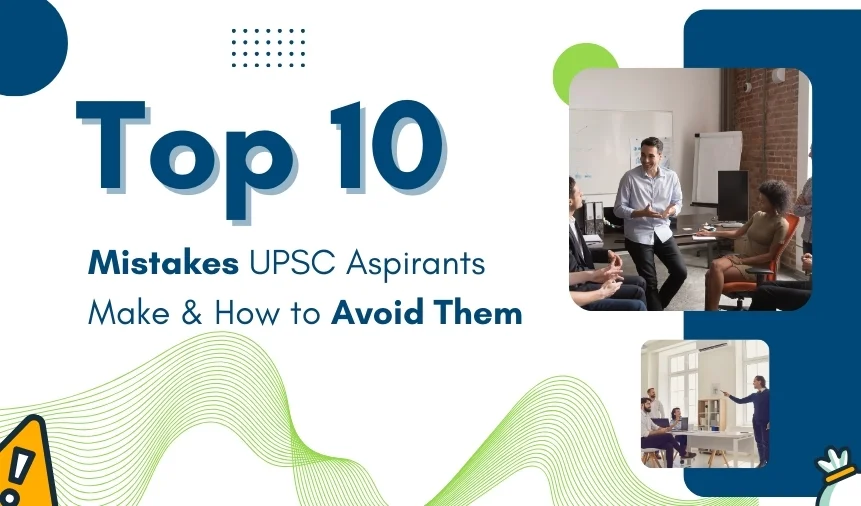Top 10 Mistakes UPSC Aspirants Make & How to Avoid Them
 February 25,2025
February 25,2025
Among the hardest and most esteemed tests available in India, the Union Public Service Commission (UPSC) Civil Services Examination (CSE) is Many candidates commit years of their lives to this test, yet despite their diligence, many of them fall short of the requirements due to serious flaws in the preparation techniques. The following sections provide a list of the top 10 common errors students make throughout their preparation at civil services coaching:
1. Insufficient of a Clear Plan
Many contenders start their UPSC preparation without a clear plan. Without a road plan, preparation usually comes out as disorganised, unpredictable, and ineffective. This sometimes results in wasting valuable time and lost chances to systematically address important subjects. Attaching the desired score and position in the UPSC depends on a methodical study schedule.
2. Denying the Value of the Syllabus
Though many candidates initially neglect to study the UPSC syllabus, it is the road map for your preparation. This results in uncertainty about which subjects to concentrate on, which causes students to study pointless material or overlook key syllabus items. Ignoring the syllabus completely usually means missing those crucial subjects from the test point of view and reading those subjects with little bearing on the exam.

3. Overloading with Content for Studies
Students can mislead themselves in the era of plenty of resources by gathering too many books and study tools. One of the prevalent misunderstandings is the belief that additional resources would lead to better preparedness. Material overload may cause uncertainty and lack of attention towards using one resource. More vital than count is quality. How much you can obtain from restricted and appropriate resources will help you in good stead instead of burdening you with too many materials that will overburden you with excess and unnecessary knowledge.
4. Ignoring Contemporary Issues
Both the Prelims and the Mains tests depend heavily on current events. Many candidates either ignore current events or consider them an afterthought, not realising that UPSC wants applicants to be knowledgeable in recent developments across many sectors. The UPSC test depends on this vital component. Examiners' first concern is the student's understanding of political, social, and financial developments. The government evaluates students' knowledge of modern concerns and policy choices influencing public and social welfare.
5. Skipping Edit
Although studying new subjects is vital, many candidates neglect to give top-level attention to regular revision. Consistent revision helps ensure that earlier knowledge is easier to remember, which might negatively impact performance—especially in the Mains test. We should always review the study notes to update ourselves on all the main subjects daily. Reviewing all the prior lessons will enable us to remember them when we address fresh subjects. It guarantees a consistent equilibrium in our preparation process and helps us avoid forgetting little but significant subjects from the test point of view.
6. Not Developing a Response Writing Style
The UPSC exam examines not just your knowledge but also your capacity for clear presentation of that information. Many applicants concentrate on reading and comprehending the content but ignore consistent response writing practice. Weak articulation throughout the test and poor time management might follow from this. High marks on the UPSC MAINS exam depend critically on your solutions being coherently presented in a well-organised way. Achieving the desired UPSC marks depends on the methodical arrangement of your thoughts followed by logical presentation.
7. Pursuing many objectives concurrently
As applicants want to be perfect in all facets of UPSC, they sometimes mistake pursuing too many objectives simultaneously. Pursuing ideal knowledge in great detail or simultaneous preparation for the Prelims and the Mains could cause tiredness and ineffective preparation. A student's goal should be to combine good preparation with a consistent strategy, including selecting relevant and vital subjects and delving in as much depth as necessary from the test viewpoint.
8. Ignoring Both Physical and Mental Health
The UPSC getting ready process is protracted and psychologically taxing. Many applicants overlook their physical and emotional health because they think success comes from only diligence. Burnout, stress, and a drop in general performance sometimes follow from this. Mental health comes first, followed by appearance for tests. Your health determines your performance on any test; the same is true with UPSC. Showing up for UPSC tests in good health and with a fresh mind always produces the intended outcomes and helps you to get excellent marks.
9. Not Appreciating the Value of the Optional Subject
Success in the UPSC Mains depends on selecting the correct optional subject; nevertheless, many applicants make quick judgements without properly considering the curriculum or their interests and strengths. A badly selected optional topic can reduce your chances of doing well. Choosing the appropriate optional subjects allows you to increase your chances of scoring well as you already know that paper compared to other papers whose themes one needs to learn from fresh.

10. Ignoring Advice Based on Correct Resources
With so many online and physical resources at hand, one might easily become lost in the sea of study tools. Many applicants fall into the trap of depending on unreliable or poor-quality materials or of hopping from one source to another without ever finishing one completely. A smart choice of study materials is a key preparation technique that enables a candidate to approach the test with serenity.
Conclusion
Preparing for UPSC calls for consistency, patience, and concentration. Avoiding these typical errors with the best civil services coaching can help you maximise your chances of success, lower needless tension, and increase your efficiency. Stay dedicated, follow your strategy, and aim for perfection, and UPSC will be only a little distance from your path of preparation.

